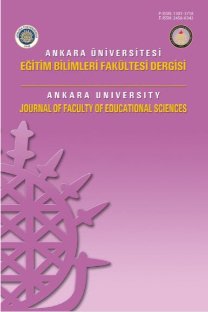Yeni müzebilim bağlamında müze eğitimine çağdaş yaklaşımlar ve müze eğitimcisi
Contemporary Approaches and Museum Educator within the Context of New Museology
Museum contemporary museum, museology, museum education, museum educator,
___
- Abacı, O. (1996). Müze Eğitimi, Yayımlanmamış Sanatta Yeterlilik Tezi. Marmara Üniversitesi Sosyal Bilimler Enstitüsü. İstanbul.
- Ambrose, T., Paine C. (1993). Museum basics, (3rd Ed). London: Routledge.
- Artar, M. (2010). Müzede öğrenme. B. Onur (Ed.) Müze Eğitimi Seminerleri (2): Mardin Müzeleri (ss: 55-72). Mardin: Ankara Üniversitesi Çocuk Kültürü Araştırma ve Uygulama Merkezi ve Mardin Valiliği Mardin Arkeoloji Müzesi Müdürlüğü.
- Association of Children's Museums (ACM) (2009). Annual Report 2009. Çevrimiçi:http://www.childrensmuseums.org/index.php/annual-report.html adresinden 28.01.2012 tarihinde erişilmiştir.
- Association of Science and Technology Centers (ASTC) (2008). History and mission. Çevrimiçi:http://www.astc.org/sciencecenters/find_scicenter.html?centers=yes&url_start_ page=37 adresinden 10.11.2008 tarihinde erişilmiştir.
- Atagök, T. (2003). Müzecilikte Yeni Yaklaşımlar. B. Onur (Ed.) Müze Eğitimi Semineri 1, Akdeniz Bölgesi Müzeleri. Antalya: Suna-İnan Kıraç Akdeniz Medeniyetleri Araştırma Enstitüsü Yayınları.
- Bonner, P., J. (1985). Museums in the classroom and classrooms in the museum. Antrophology and Education Quarterly, 16 (4), 288-293.
- Clive, S. (1991). Questions of gallery education. In Moira Vincentelli (Ed.), Gallery Education and the New Art History (pp. 3-8). UK: The Art Council of Great Britain.
- Çolak, C. (2006). Sanal Müzeler. Türkiye'de İnternet Konferansı (21-23 Aralık 2006). ttp://inet- tr.org.tr/inetconf11/bildiri/ adresinden 25.08.2012 tarihinde erişilmiştir.
- Diminicho, E. (2004). Europens Children's Museum: A Quest for Identity. Yayımlanmamış Yüksek Lisans Tezi. Universita Commerciale Luigi Bocconi, Milano, İtalya.
- Falk, J., Moussouri, T. & Coulson, D. (1998). The effect of visitor's agendas on museum learning. Curator, 41 (2), 107 -120.
- Falk, J., H.(1999). Museums as institutions for personal learning. Daedalus, 128(3), 259.
- Falk, J.; Moussouri, T. & Coulson, D. (1998). The effect of visitor's agendas on museum learning. Curator, 41 (2), 107 -120.
- Falk, J., H., Dierking, L.,D. (1997). School field trips: Assessing their long-term impact. Curator, 40 (3), 11-18.
- Gaskins, S. (2007). Cultural play and learning in children's museums. Hand to hand, 22 (4), 7-8. USA: American Association of Museums.
- Greenhill, H., E. (1999). Müze ve galeri eğitimi, (Çev.Meltem Örge Evren, Emine Gül Kapçı), Prof. Dr. Bekir Onur, (Ed.). Ankara: Ankara Üniversitesi Çocuk Kültürü Araştırma ve Uygulama Merkezi Yayınları, No:4.
- Greenhill, H., E. (2000). Museums and the interpretation of visual culture. New York: Routledge.
- Greenhill, H., E. (2007). Museums and education. purpose, pedagogy, performance. London: Routledge.
- Griffin, J. (2004). Research on students and museums: looking more closely at the students in school groups. Science Education, 88 (1), 59-70. UK: John Wiley & Sons, Inc.
- Gurian, H. E. (2006). Civilizing the museum: the collected writings of elaine heumann gurian. New York: Routledge.
- Hatton, A. (2008, June). The development of museums social-purpose. Paper presented at Baltic museology school: the museum's social purpose, Palmse, Estonia.
- Hudson, S., & Ritchie, R., J. (2006). Promotoing destinations via film tourism: An empirical identification of supporting marketing initiatives. Journal of Travel Issues, 44(4), 387-396.
- ICOFOM (2010). Key concepts of museology (Museologie Anglais), ICOFOM. http://icom.museum/fileadmin/user_upload/pdf/Key_Concepts_of_Museology/ Museologie_Anglais_BD.pdf adresinden 12.11.2012 tarihinde erişilmiştir.
- Kai-Kee, E. (2011). Sanat müzesinde eğitimin kısa bir tarihi. E. Kai-Kee; R. Burnham (Ed.) Müze dersleri: yorum ve deneyim (ss. 51-108). İstanbul: Koç Üniversitesi Yayınları.
- Lord, B. (2007). What is museum-based learning?. In Barry Lord (Ed.), The manuel of museum learning (p.13-19). New York: AltaMira Press.
- Mayfield, I., M. (2005). Children's Museums: purposes, practices and play? Early Child and Development Care,175 (2), 179-192.
- Mensch, P. (2004). Museology and management: enemies or friends? Current tendencies in theoretical museology and museum management. In Euope in museum management in the 21st century (p.3-19). Tokyo: Museum Management Academy.
- Nuzzaci, A. (2006). General education and museum education: Between singularity and plurality. Revista complutense de education, 17 (1), 65-75.
- Reeve, J.,Woollard, V. (2006). Influences on museum practice. In C. Lang ve J. Reeve, (Eds.), the Responsive Museum (p:5-17). Hampshire: Asgate Pub. Ltd.
- Sandell, R. (2003). Social inclusion, the museum and the dynamics of sectoral change. Museum and Society, 1(1), 45-62.
- Talboys, K., G. (2011). Museum educator's handbook. (3rd ed.). United Kingdom: Ashgate Publishing.
- Torch, C. (2010). European museums and interculture: responding challenges in a globalized world. European Council Report, Stockholm.
- Whitehead, C., Eckersley, S., & Mason, R. (2012). Placing migration in european museums:theoretical, contextual and methodological foundations. Milano: MELA Books.
- ISSN: 1301-3718
- Yayın Aralığı: Yılda 3 Sayı
- Başlangıç: 1968
- Yayıncı: ANKARA ÜNİVERSİTESİ (EĞİTİM BİLİMLERİ FAKÜLTESİ)
Yeni müzebilim bağlamında müze eğitimine çağdaş yaklaşımlar ve müze eğitimcisi
Ceren KARADENİZ, Ayşe OKVURAN, Müge ARTAR, Ayşe ÇAKIR İLHAN
Öğretmen eğitmenleri ve BİT kullanımı etik konuları: akademik ortamlarda elektronik kitap kullanımı
Ferit KILIÇKAYA, Jarosław KRAJKA
Geleceğin sanat eğitiminde göstergebilim yeri
Reconsidering Brechtian elements in process drama
Semiotics in the Future of Art Education
İşlemsel uzaklık algısı ve uzaktan eğitim uygulamalarına yansımaları
Türkçe Öğretmenliği Özyeterlik Algısı Ölçeğinin geliştirilmesi: güvenirlik ve geçerlik çalışması
Erdem ÇOCUK HALİL, Devrim ALICI, Özler ÇAKIR
Ulaşım Sektöründe Kadın Emeği: Ankara'da Çalışan Kadın Sürücü Ve Makinistler
Birgül ULUTAŞ, Deniz SAPAZ, Derya DUMANLI
Ortaöğretim 9 ve 12. sınıf öğrencilerinin sürdürülebilir çevre bilinci düzeyleri
